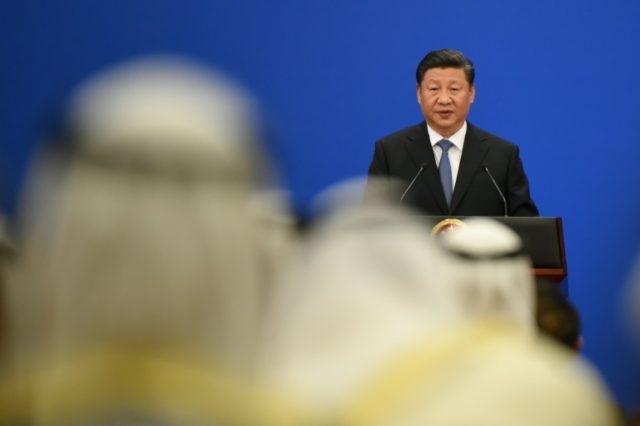China’s communist leader Xi Jinping begins a whirlwind tour of Africa and the Middle East Thursday, hoping to expand the nation’s One Belt, One Road (OBOR) project throughout the continent and solidify trade deals with the United Arab Emirates (UAE).
The UAE, one of China’s closest trade partners in the region, will be Xi’s first stop on a tour that will also take him to Senegal, Rwanda, South Africa and Mauritius, according to the state publication Global Times. The newspaper argues that the visit is specifically for Xi to sell OBOR projects to these countries, except for the visit to South Africa, where Xi will attend a meeting of the leaders of BRICS nations (Brazil, Russia, India, China, and South Africa).
OBOR is a global infrastructure initiative in which China seeks to build and control the world’s largest and newest ports, roads, and railways. In the process, China preys on developing countries by offering unpayable loans at high interest rates and, as in the case of Sri Lanka, demanding control of the infrastructure projects created as payment for the loan.
The U.S. State Department has repeatedly condemned OBOR as a threat to international stability and warned developing countries not to take the loans.
The UAE is currently the most lucrative stop for Xi in his upcoming tour. Abu Dhabi agreed to welcome Chinese infrastructure projects, including the Khalifa Port terminal and the construction and maintenance of significant oil fields. As of February, the two nations had agreed on joint projects worth $10 billion and counting.
“In order to bring China into the upstream of its energy market, the UAE has offered special managerial and operational rights for ground-based and sea-based oil fields to Chinese companies,” Hua Liming, China’s former ambassador to the UAE, told the Global Times.
To reach out to Emiratis, Xi wrote a column published in the country’s The National newspaper arguing that the arrival of OBOR to UAE was fate, as Chinese merchants did business with the Middle East thousands of years ago.
“The friendship between the peoples of China and the UAE dates back to ancient times,” Xi wrote. “Our ancestors started trade through the ancient Silk Road well over 2,000 years ago and forged a friendship that remains vibrant to this day.”
“China and the UAE have become bosom friends who help and complement each other, and important partners who always communicate and coordinate with each other on regional and international affairs,” Xi added.
The column states, in practical terms, that China and the UAE will work on onshore oil development, solar energy projects, financial agreements between the two national banks, and increased tourism interactions.
“The UAE is now the most favored first stop for Chinese tourists traveling to Arab destinations in the Middle East. In 2017, the number of Chinese tourist arrivals in the UAE exceeded the mark of one million for the first time in history, and about 3.5 million Chinese tourists transited through the UAE,” Xi writes.
The references to ancient ties are a staple of the marketing surrounding OBOR – and the land and maritime territory grabs that it represents. In the South China Sea, where China claims most of the body of water as part of its “Maritime Silk Road,” Xi Jinping has repeatedly claimed that international waters belong to China because they have done so since ancient times. In a Xinhua propaganda piece on OBOR in 2015, the state outlet claimed, “for thousands of years, the Silk Road Spirit … has been passed from generation to generation, promoted the progress of human civilization, and contributed greatly to the prosperity and development of the countries along the Silk Road.”
OBOR has already caused significant trouble where its projects have begun. In Sri Lanka, China took over control of a port it built using a predatory loan that the local government could not pay back. Montenegro is on the brink of a similar situation that would see it default on a major loan to build a road into Serbia. Pakistan, where OBOR has faced challenges from the local terrorist groups possessing many of the regions where roads and ports are most needed, has continued with investment from China at dangerously high debt rates.
In Kenya, China is building the nation’s largest infrastructure project in decades, importing thousands of Chinese workers to take Kenyan jobs and keeping Kenyans from any skilled labor, ensuring that China will need complete access to the country indefinitely for maintanence and repair work on the railway. China has also been reportedly using the nation’s tourist visas to illegal import hundreds of extra Chinese workers, depriving Kenyans of jobs.

COMMENTS
Please let us know if you're having issues with commenting.